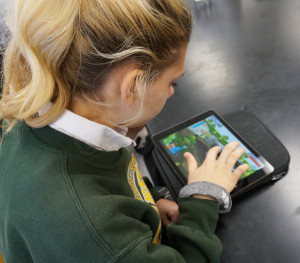Cabrini High School students are among the first in the US to participate in the pilot-test of the “Journey 2050” environmental learning program developed by Agrium and introduced to schools through the Nutrients for Life Foundation.
 The Environmental Science classes of Ann Smart are testing the “Journey 2050” web site learning simulation, under the oversight of Tiffany Ballow, local representative of the Nutrients for Life Foundation. “Journey 2050” is a new program in the pilot-testing phase and Cabrini is only the 6th school in the US to use it. Feedback from the students and science department faculty will assist in perfecting the program before it goes into wider use.
The Environmental Science classes of Ann Smart are testing the “Journey 2050” web site learning simulation, under the oversight of Tiffany Ballow, local representative of the Nutrients for Life Foundation. “Journey 2050” is a new program in the pilot-testing phase and Cabrini is only the 6th school in the US to use it. Feedback from the students and science department faculty will assist in perfecting the program before it goes into wider use.
“The “Journey 2050” program is a new applied environmental science exercise that requires students to make decisions on how to feed the estimated 9 billion inhabitants on Earth by the year 2050,” noted Ann Smart, Cabrini Science Department Head. “Students must take into account best practices in agriculture and coordinate these practices throughout different areas of the world to enhance worldwide production in order to assure a sustainable, global food supply. At the end of the simulation, students will be exposed to various opportunities and careers related to agri-business and global resource planning and allocation.”
As part of Cabrini’s STEM (Science Technology Engineering Math) initiative, the school’s participation in this program allows the school to stay on the forefront of advances in STEM instructional methods. “Focusing on STEM education and training prepares our graduates to succeed in college and in the workforce,” cited Ardley Hanemann, Cabrini’s President. “Career opportunities in the STEM fields continue to increase and accelerate in the US. We want our students to be positioned to excel in these fertile fields.”
